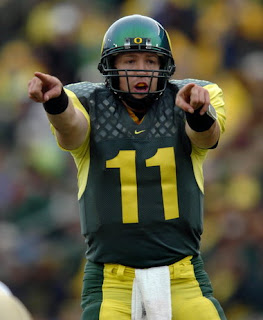 Drafted in the second round in 2006, Kellen Clemens #11 was supposed to be the man-in-waiting for the end of Chad Pennington's career. Is there any more hopeful gesture in the football universe than the drafting of a quarterback? I don't mean drafting someone like Andrew Luck, Matt Leinart or Mark Sanchez, in the first round. I mean drafting someone like Kellen Clemens in the second, a thrown hope in a field of hopefuls from many positions. Sitting there, seemingly innocuous, he may well be the future of the franchise, for all you know. Ah, but then let's not go there just yet. Not just yet. Ah, but maybe. Maybe.
Drafted in the second round in 2006, Kellen Clemens #11 was supposed to be the man-in-waiting for the end of Chad Pennington's career. Is there any more hopeful gesture in the football universe than the drafting of a quarterback? I don't mean drafting someone like Andrew Luck, Matt Leinart or Mark Sanchez, in the first round. I mean drafting someone like Kellen Clemens in the second, a thrown hope in a field of hopefuls from many positions. Sitting there, seemingly innocuous, he may well be the future of the franchise, for all you know. Ah, but then let's not go there just yet. Not just yet. Ah, but maybe. Maybe.But not most quarterbacks, and not Kellen Clemens. Today he is technically a backup in St. Louis. His #11 was taken from him and reduced by ten to #1, a jersey number which is often ironic in this game because it is the number everyone wants to be, but not to wear. You cannot name anybody successful in football who wore #1. You barely find a kicker who wears it well.
Another #11 drafted backup is J.J. Jones. He was the first African-American quarterback for the New York Jets. A rookie from Fisk University, Jones was the sole backup to Namath, and like the others before him in the 70's - Demory, Woodall, Davis - Jones' primary goal was to hand the ball off to John Riggins (though the others handed off to Boozer, too). As depicted in the card to the left, he was obviously put into Ken Shipp's first game as coach that year, a 37-6 loss to the St. Louis Cardinals, probably in the fourth quarter, after one of Namath's passes was returned for an interception. He started against the San Diego Chargers in week 13, after Namath apparently missed curfew during the week. It was a gesture, merely. Jones threw about six passes total, and then Namath went into the game at the start of the second quarter. The Jets lost to a poor San Diego team, 24-16. It was his first and last starting job as a pro.
No sooner did that moment pass into oblivion (or my memory) than - according to the alumni newsletter from Fisk University - J.J. was named a Presidential Appointee by President Gerald R. Ford to the U.S. Department of Commerce's Office of Minority Business Enterprise. He was also a co-founder of Pacific Northwest Chapter National Black Chamber of Commerce in Seattle in 1996. He became a fairly respected member of the community, and that's why his death in 2009 was newsworthy. He died in a house fire, apparently, the work of an arsonist, very likely his nephew, a mentally ill man who had been living with Jones and his partner.
At JetNation, the news of his death was joined with an update that Jones himself gave back in March 2008 in reply to the question, "What happened to JJ Jones?" In reply to JetNation's all-points request, Jones made a provocative comment about Lou Holtz that's worth reading. He made an excellent point about himself as a pioneer, for he was. Seeing an African-American at quarterback position was a sight to which the eyes of the nation needed to adjust in the 1970's, and whether at backup, or starting, as James Harris did in Los Angeles, or starting for the injured Terry Bradshaw, as Joe Gilliam did, the black quarterback was seen as an anomaly. To my mind, this has only recently changed.
Warren Moon is a Hall of Famer who, as Jones points out, credited "James Harris and a couple of others" in his induction speech. Moon won the Rose Bowl for the University of Washington two years after Jones retired. "I met Warren Moon when he visited Mount Zion my church home in Seattle," Jones writes, "and I told him I was one of those 'couple of others!" Most of us are backups like Clemens and Jones, and perhaps that's all we will be. But all of us, whether we realize it or not, are one of a couple of others to someone somewhere, offering a place for someone else to fill, even when the person who benefits from it never knows who we are.

1 comment:
Great story (and link) about J.J. Jones. I've been a Jets fan since their first season but for the life of me i can't remember him. Thanks for the research.
Post a Comment